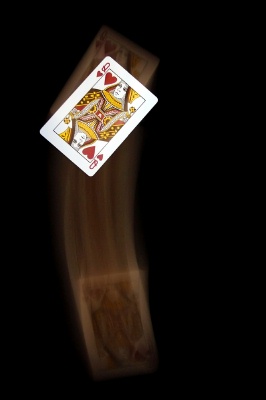|
|

Angle –
1. An unethical method of gaining a tactical advantage over another player.
2. An opportunity for profit in gambling.
The game of poker is rife with rules and procedures governing play. These range from rules which are set in stone, to ethical
guidelines, to common courtesies. This can lead to problems, especially when players refuse to respect the courtesies and ethics
inherent in the game, or go even further and attempt to bypass the rules. When a player engages in this type of behavior, it’s called
“shooting an angle.” Unfortunately, this type of behavior can lead to a tactical advantage over players who respect the rules, ethics
and courtesies of the game. The players who do not engage in these violations will not accept it when an opponent breaks or bends the
rules in an unethical manner in order to gain advantage in the game, nor should they. If these violations were allowed to stand, the
game would devolve to the point where everyone would be taking shots at each other. Obviously, this would destroy the integrity of the
game. So it is in everyone’s best interest to keep angle shooters from practicing their art.
Here is an example of a common violation that would be considered shooting an angle. Imagine that two players, Rob and Tom are heads up
in a Hold’em hand. Rob, who acts first, has been checking the whole way, and Tom, who acts last, has been betting. On the river, Rob
makes an ambiguous but intentional hand motion, which is generally taken as a check. Rob has been checking the whole way, and Tom
interprets his motion as a final check. Tom, who has a fairly weak hand, elects to check behind Rob, and since the hand ends with this
action, subsequently turns his hand over to reveal third pair. Rob, upon seeing Tom’s hand, bets. Rob now claims that he made no
definitive checking motion, and that Tom therefore had acted out of turn. Rob insists that he be given the right to bet, despite Tom’s
assumption that the hand is already over. The reality of the situation here is that Rob saw an opportunity to shoot an angle on Tom.
The issue here is the nature of Rob’s checking motion on the river, as well as the intent behind it. The rules state that a player may
check by verbalizing his intent as such, and that he may also check by rapping the table with his fist. However, players make all sorts
of hand motions which are also generally accepted as a check. These motions include tapping or waving an index finger, waving the entire
hand or pointing at the next player to act, to name a few. Players also sometimes make an inadvertent hand motion when it is their turn
to act, with no intention of checking. So out of respect for the game there is a mutual understanding among players that each side will
do their best to be clear about the others intent before
acting. When there is a dispute about an action, it is often
up to the floorman to decide. In the case above, Rob made
an ambiguous motion on purpose, in a blatant attempt to shoot an angle. If the floorman were called on to make a decision here, he would
decide in favor of Tom, provided he was given enough information about the situation to make the correct decision.
In the poker world, the term “angle” generally has negative connotations, and implies a desire or attempt by an ethically questionable
actor to circumvent the rules in order to take advantage of the other players. The ethical majority of poker players consider angle
shooters lowlifes and cheaters. But when the term “angle” is applied to gambling situations outside of the poker world, it often drops
its negative connotation. A sports or horse bettor can have an angle which is perfectly legitimate and requires no malfeasance. In this
context, an angle simply means a path to profit. For example, a sports bettor may bet a home team simply because they have won twelve
out of their last fifteen home games. Alternatively, a horse bettor may notice that a certain jockey at a certain track racing in
certain conditions may yield a long term profit, and so will always wager in that spot. These analyses would be their angles. In this
context, having an angle is perfectly legitimate, and a good thing. In fact, the better your handicapping skills are, the more angles
you will see. So it is generally necessary for a good handicapper to “see” an angle before he will risk his money, and the more angles
he sees, the more profitable wagers he will be able to place.
Usage: Angle Shooter, See an Angle, Shoot an Angle
Previous Poker Term: All In
Next Poker Term: Ante
|
|









